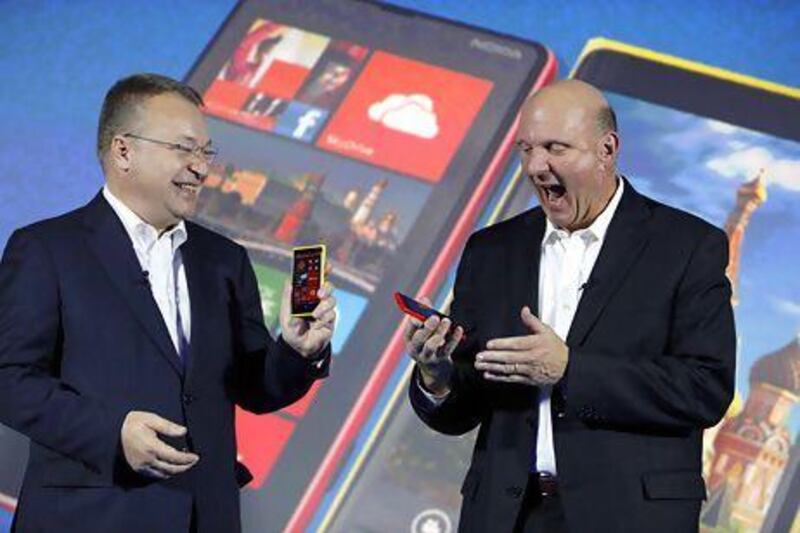Can small economies sustain big brands? The answer, after the US$7.2 billion sale of Nokia's mobile business to Microsoft, seems to be a resounding no.
The issue appears more acute than ever in the telecoms business, coming soon after the financial problems at BlackBerry, the Canadian company that ruled the mobile roost for a brief period but which has now admitted it is up for sale as the sales and profit figures plummet.
UAE brand builders should take note. Going global from a small geographic and financial home base is fraught with difficulties. Only one company in the region - Emirates Airline - appears to have managed it successfully so far.
For a while in the 2000s, Nokia was the undisputed king of the global mobile market. At the start of the decade, it had a market capitalisation of $250bn. It had 25 per cent of the global handset market in 2008, and was a source of pride in its native Finland. The company had begun life as a paper and pulp manufacturer, and only branched out into telecoms in the 1980s.
The story since 2008 has been one of unremitting disaster. It is no longer in the top five handset manufacturers, and has clocked up €4bn (Dh19.35bn) of losses in the past two years. That kind of performance is catastrophic anywhere in business. It has proved to be terminal in the fast moving world of mobile telecoms.
The reason for Nokia's demise is in the hand of virtually every mobile phone user, and that means all of us.
The rise of the smartphone, most notably in the shape of Apple's iPhone but also in the form of Google's Android operating system, showed Nokia to be a minnow in design, technology and finance.
It simply could not out-market or out-design the big players in the mobile market, especially Samsung, which ate inexorably into Nokia's once-enviable Asian market share. Nokia's slice of the global market fell to 3.5 per cent.
To give Nokia's management some credit, they did realise that they were ill-equipped in this global dog-fight, and in 2010 brought in Stephen Elop from Microsoft. As an executive who had been at the sharp end of one of the big American players in the technology business, they hoped he would revitalise the Finnish company.
To give Mr Elop credit, he realised there was no point in Nokia running its own operating system, and instead moved to the Windows system of his former employer. It could be viewed as a rational decision in a global market. In Finland, he was regarded as a Trojan Horse for Microsoft.
In any case, the move was a failure. Windows has less than 4 per cent of the world market. Even cash-rich Microsoft is finding it difficult against Apple and Android.
Mr Elop's reputation in Finland will not be enhanced by the fact that he is going back to Microsoft after the deal, as head of its mobile phone business.
He said the deal was a chance for Nokia and Microsoft to combine handset manufacture expertise with operating system capability, and that it would benefit "employees, shareholders and consumers". That remains to be seen.
Consumers - at least of the handsets - are a dwindling bunch, so reversing the trend of the past two years seems an extreme uphill course; the track-record of multinationals in maintaining local employment after an acquisition is patchy.
Only Nokia shareholders, who get a big chunk of cash and who saw their shares soar 40 per cent on the news, can truly see upside in the deal. Nokia will now focus on its telecoms equipment business, which is itself feeling intense pressure from Chinese manufacturers.
Some experts believe the world will end up in two branding camps: the well-financed, technology-driven marks of the West, led by the United States, and the mass-produced, domestic-consumer brands of the East, led by China. The fate of Nokia, and probably with BlackBerry to come, does nothing to argue against that line.
fkane@thenational.ae
Small countries and big brands no longer seem a viable match
Can small countries sustain big brands? The answer, after the US$5.4 billion sale of Nokia's mobile business to Microsoft, seems to be a resounding no.

Editor's picks
More from the national




